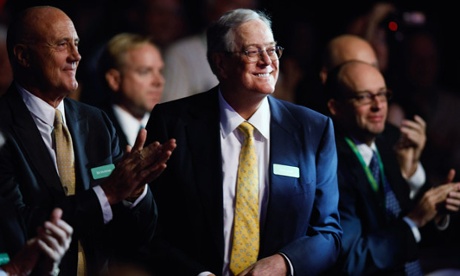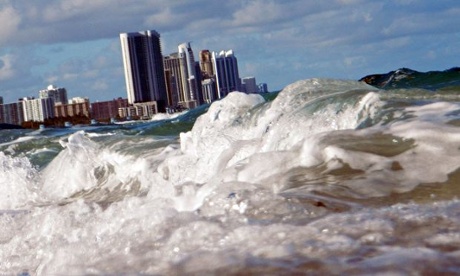Tom Steyer: the green billionaire pouring millions into the midterms
The green billionaire Tom Steyer this week solidified his status as the leading patron of environmental causes in American politics, with the announcement that he had given nearly $56m to make climate change a top-tier issue in the midterm elections.
With just days to go until the elections, it was revealed that Steyer had poured an additional $15m of his personal fortune into his NextGen Climate Action Fund, raising his contributions to $55.9m, according to Federal Election Commission filings on Monday night.
The former hedge fund executive has now emerged as the biggest single donor of this election cycle – at least as far as publicly disclosed donations are concerned – and a favorite new punching bag for Republican opponents, a role previously reserved for Al Gore.
The ready cash could make Steyer the kingmaker of these elections – if his bets on candidates in seven key Senate and gubernatorial races come in.
It has already re-cast climate change as an election issue both now and in the 2016 presidential contest, argued Chris Lehane, a Democratic operative who is now NextGen’s chief strategist.
“We call 2014 a pivotal year for climate,” he said. “If you look around it’s clear that climate has emerged as a top -tier issue.”
Steyer is still nowhere near reaching the $100m he promised to inject into races in this election cycle, half of it from outside donors. But he has already assembled a campaign organisation that includes some of the country’s top operatives – and gained near-heroic status among environmental activists for his free-spending ways.
And he is apparently enough of a threat to Republicans to merit his own attack website, which labels Steyer a “man of too many contradictions” and comes adorned with a photo of a champagne-swilling Leonardo DiCaprio.
Steyer has also been accused of worsening the influence of money over politics – a Democratic equivalent of the conservative oil billionaire Koch brothers. And there have been reports he is using NextGen as a dry run for his own future political campaign, perhaps for senator or governor of California.

As Steyer himself has admitted, “climate change has not always been on my radar”. After a privileged upbringing on New York’s Upper East Side, Steyer spent 25 years building his own hedge fund, Farallon Capital Management, and amassing a personal fortune estimated at $2.6bn. Much of that wealth came from investments in coal and other fossil fuels, the New York Times reported.
But in 2010 he bankrolled a campaign to defeat a ballot initiative in California that would have blocked the state’s ambitious programme to cut carbon dioxide emissions.
In 2012, he sold his ownership stake in Farallon in order to campaign full-time on climate change, and instructed his employees to screen out holdings of tar sands, coal, oil and gas.
When Steyer jumped into the 2014 race, he was immediately adopted as something of a saviour by Democrats and environmental groups. Gore called him “Mr Tipping Point” in the fight against climate change. With two weeks to go, that remains to be seen.
The $56m in Next Gen contributions – though record-breaking – are only for disclosed funds, a pivotal distinction in an election which is believed to be awash in so-called “dark money”, or anonymous donations.
The Koch brothers’ network of groups is believed to be spending up to $300m this election cycle, $125m or more of which could be coming through their main political organisation, Americans for Prosperity. Steyer’s contributions have been focused on a handful of tight races for senate and governor where the extra cash could help tip the balance towards Democratic candidates.
Those seven races include senate contests in Colorado, Iowa, New Hampshire and Michigan and gubernatorial elections in Florida, Pennsylvania and Maine. (In Maine, Steyer is backing an Independent party candidate.)
The strategy is broadly similar. NextGen Climate – as well as other environmental groups such as League of Conservation Voters and the Natural Resources Defence Council Action Fund – has run ads ridiculing Republican candidates for denying climate science and accusing them of cozying up to oil and coal companies.

In Florida, NextGen spent $8.6m on 20 offices and hundreds of staffers and volunteers to try to defeat the Republican governor, Rick Scott. The group also began hauling around a wooden ark festooned with blue life buoys – accusing Scott of only making room for wealthy donors, while leaving ordinary Floridians at the mercy of rising seas.
In Michigan, NextGen hasspent $3m on TV, radio, and digital ads attacking the Republican candidate for the Senate, Terri Lynn Land, for being too close to the Kochs. Steyer visited Iowa earlier this month, where NextGen is backing Bruce Braley, the Democratic candidate for the Senate.
With two weeks to go, candidates backed by Steyer are ahead or holding their own in New Hampshire and Michigan and all three of the gubernatorial races.
Outside those key races, however, it’s uncertain whether Steyer has got Americans to focus on climate change. Although the number of Americans who agree human-caused climate change is occurring is on the rise, according to polls, the environment is still crowded out as an election issue, generally ranking towards the bottom of voters’ concerns.
Lehane, while presenting internal polling data showing strong concern for climate in Steyer’s seven targeted states, acknowledged that the issue is important in trying to define what he called the “Republican troglodyte narrative”.
“Climate really for the first time in a long time is being used as an offensive issue – a wedge issue and an offensive issue – for Democrats,” he said.
Larry Sabato, a political scientist at the University of Virginia, said the true test of Steyer’s political acumen would be whether he could help Democrats retain control of the Senate. That’s a high bar, Sabato admitted.
“If the Democrats shock us and say hold on to the Senate 50-50, I am sure he will have contributed to Democratic victories in some of those states,” he said.
At the very least, Sabato said Steyer would deserve some credit for elevating the climate issue this time around, and preparing the ground for future races.
“It’s moved some voted. It’s created voter education,” he said. “It’s a slow educational process and its not like its his last dollar.”
guardian.co.uk © Guardian News & Media Limited 2010
Published via the Guardian News Feed plugin for WordPress.

